(By Kholoud Ramzi, Baghdad, for Niqash)
Election posters have become a joke to cynical Iraqi voters.
Election campaign posters are telling cynical Iraqi voters nothing – there is barely any information on political aims or manifestos. So ordinary Iraqis are getting their own back with ridicule, sarcasm and some judicious photo shopping.
Election campaigning started in Iraq last week with literally thousands of would-be politicians trying to win around 22 million voters’ hearts and minds by election day, April 30. And the cities and towns of Iraq are now filled with campaign posters and placards, the streets are full of candidates shaking hands, kissing babies and distributing alms to the poor.
But all of this is also having an unintended effect in many quarters of Iraqi society. Outdated slogans, empty rhetoric and unnecessarily dramatic or heroic poses on placards have become fuel for ordinary Iraqis’ cynicism about the political process and fodder for jokes and mash ups. None of the information available really offers anything useful or allows voters to read a manifesto that would help them decide who to vote for and why.
A poster for Ahmad Jassim, who apparently represents the interests of the poor and unemployed, was ridiculed because the candidate was posed “like Rose, in the movie Titanic”. Some Facebook wits altered the picture to make it look as though the candidate was facing Leonardo DiCaprio.
“Candidates think that the way they stand or the way they move their hands and gesture when they talk will distinguish them,” says one 60-year-old Baghdad local who wished only to be known as Saif, a regular at cafes in Baghdad’s Hurriya neighbourhood. “Many of them distribute cards and prepaid mobile phone credit. But they don’t realize all this makes them look like a joke.”
Slogans on various posters have also been the butt of jokes.
One female candidate, Amal al-Kashif, who’s running as part of the Muwatin, or Citizen, coalition that’s affiliated with Iraq’s Islamic Supreme Council, had only two lines on her posters. One where she said she supported breast feeding. And another where she promised religious tours to the central Iraqi city of Samarra, free of charge.
Another candidate, Afaf al-Tamimi, simply introduced herself. Her posters are adorned with a series of bullet points listing her educational, and then political, achievements. There’s nothing about what the candidates or their parties might do for their constituents.
Meanwhile lawyer Muwafaq Taha, who is running for the mostly Sunni Muslim Arabiya party, said that he is only competing in the elections because God told him to. “I swear by almighty God that I nominated myself to run for Parliament because I was told to do so by a messenger from God,” his poster boasts.
This particular poster has been a favourite on websites like Facebook; many of those who comment on it say the candidates are naive to think they can fool the voters by using religious slogans and saying they’ve been specially chosen by God.
Other candidates are relying on their family connections rather than their divine ones. One man used his brother’s name to introduce himself because his brother was better known than he was. His posters say: “Dr Sabbah Shakir, the brother of Captain Hakim Shakir”.
And some of the more conservative female candidates haven’t even put their own pictures on their own posters. Instead their promotional material features pictures of their husbands or brothers. The slogans often say things like elect the sister of so-and-so or the wife of such-and-such.
Not all of the campaign slogans have caused laughter. Some have come in for serious criticism. Iraq’s Minister of Justice, Hasan al-Shammari, is running in the southern Iraqi province of Dhi Qar. His campaign slogan: “Dhi Qar votes for revenge”.
“This candidate is trying to use an unhealthy tradition to gain votes,” wrote one Iraqi Facebook user from Baghdad. “Our society is trying to develop a civil code that puts an end to such harmful practices yet this candidate says he supports acts of revenge.” In Dhi Qar, there is a lot of reliance on tribal law rather than federal law and, as the Facebook user argued, Iraq’s very own Justice Minister is “supporting a kind of law that allows individuals to avenge misdeeds by killing members of other families – which is against the law”.
It hasn’t just been the posters coming in for a ribbing. General tactics for campaigning have also been the subject of much criticism and laughter.
A picture of one candidate carrying a grilled chicken into Baghdad’s slum areas caused a lot of mirth and commentary on Facebook. Special cars have been touring the neighbourhood distributing meals, says Ahmed Saif, who lives in one of Baghdad’s poorer neighbourhoods. They hand out food and the cards of the candidate who is responsible for providing it – these have the candidate’s name, his candidate number and the party or list he belongs to, on them.
“These people are just playing on hunger and poverty,” Ahmed Saif says, in a disgusted tone. “They think we don’t know that they will abandon us and forget everything we need as soon as they win a seat. Unfortunately this year the elections are taking place in spring,” he then said. “Which means they won’t distribute blankets like they did in the winter.”
Mirrored from Niqash.org




 © 2025 All Rights Reserved
© 2025 All Rights Reserved